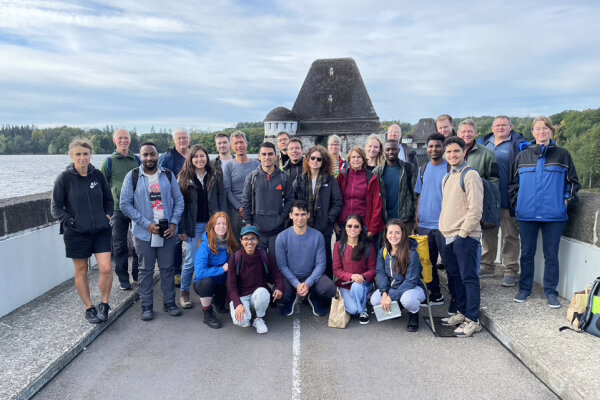13.10.2023

From 18 to 22 September 2023, the fourth Training School in the research project "inventWater" took place at RUB under the title "Managing water in complex anthropogenic landscapes".
The inventWater project is an innovative training network (ITN) within the Marie Skłodowska-Curie Action, an EU-funded project. Its aim is to provide tomorrow's water quality experts with an interdisciplinary and state-of-the-art education. In the project, 15 early-stage researchers (ESRs) from different educational institutions across Europe are developing predictive tools for the water quality of rivers, lakes and reservoirs on a regional to global scale. The increasing availability of meteorological data and modelling tools are an advantage that will be used to achieve the project goals. One of the projects (ESR2) is being carried out at the Faculty of Civil and Environmental Engineering at the Ruhr University Bochum.
During the first days of the Training School, the focus was on the exchange between the international ESRs and the presentation of the research projects of the young researchers.
On Wednesday, the participants travelled to the Möhne Dam. There, the Ruhrverband offered the young researchers an introduction to the gravity dam and a boat trip to the profiler buoy. This buoy records data on fish distribution in the lake as well as oxygen, temperature and stratification of the water body down to a depth of 50 metres. This provides a comprehensive picture of the conditions in the dam. Other items on the programme included the hydroelectric power plant at the Möhne Dam, the control gallery of the dam and the turbine house. Finally, the participants visited the Möhnesee-Völlinghausen sewage treatment plant.
In the further course of the Training School, the participants discussed legal aspects of water management, the role of governance and management with regard to improving water quality, and the influence of disinfection by-products on drinking water quality in the context of global change. This was followed by an excursion to the waterworks in Haltern am See.
At the end of the training school, the young researchers worked in groups on further solutions for the current and future challenges in water management.
From 18 to 22 September 2023, the fourth Training School in the research project "inventWater" took place at RUB under the title "Managing water in complex anthropogenic landscapes".
The inventWater project is an innovative training network (ITN) within the Marie Skłodowska-Curie Action, an EU-funded project. Its aim is to provide tomorrow's water quality experts with an interdisciplinary and state-of-the-art education. In the project, 15 early-stage researchers (ESRs) from different educational institutions across Europe are developing predictive tools for the water quality of rivers, lakes and reservoirs on a regional to global scale. The increasing availability of meteorological data and modelling tools are an advantage that will be used to achieve the project goals. One of the projects (ESR2) is being carried out at the Faculty of Civil and Environmental Engineering at the Ruhr University Bochum.
During the first days of the Training School, the focus was on the exchange between the international ESRs and the presentation of the research projects of the young researchers.
On Wednesday, the participants travelled to the Möhne Dam. There, the Ruhrverband offered the young researchers an introduction to the gravity dam and a boat trip to the profiler buoy. This buoy records data on fish distribution in the lake as well as oxygen, temperature and stratification of the water body down to a depth of 50 metres. This provides a comprehensive picture of the conditions in the dam. Other items on the programme included the hydroelectric power plant at the Möhne Dam, the control gallery of the dam and the turbine house. Finally, the participants visited the Möhnesee-Völlinghausen sewage treatment plant.
In the further course of the Training School, the participants discussed legal aspects of water management, the role of governance and management with regard to improving water quality, and the influence of disinfection by-products on drinking water quality in the context of global change. This was followed by an excursion to the waterworks in Haltern am See.
At the end of the training school, the young researchers worked in groups on further solutions for the current and future challenges in water management.
In this particular research project, climate and water monitoring data will be integrated into an existing process-based water quality modelling tool (WorldQual). For this, different machine learning approaches will be applied to support the improvement of future water quality forecasts for lakes and reservoirs with higher temporal resolution. The research has two main objectives: